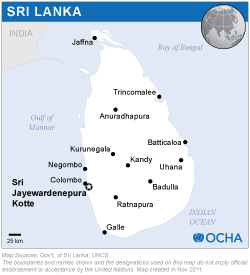IWMI has been inducted as the 16th Regional Support Office (RSO) for UN-SPIDER. An Memorandum of Understanding to this effect was signed with the United Nations Office for Outer Space Affairs (UNOOSA) on the sidelines of the 6th RSO Meeting in Vienna, Austria on 5 and 6 February 2015. The UN-SPIDER RSO will be housed in IWMI’s Water Availability, Risk and Resilience (WR) Theme, which promotes the use of spaced-based information and GIS on water-related disaster risk management to promote innovative solutions to address the challenge of disaster risk in Asia and Africa.
IWMI employs nearly 330 staff. IWMI’s research focuses on the key water challenges poor communities face-issues that affect people’s livelihoods and health, as well as the integrity of the environmental services on which they depend. Research thus examines the “water-food-environment nexus”, adopting a multi-disciplinary approach and balancing efficiency and productivity objectives with equity and sustainability concerns. Seven key Research Themes help IWMI to more effectively produce impact for the benefit of poor farmers, whose livelihoods depend on agriculture and for whom access to water for productive purposes is a key constraint. IWMI recognizes the scope for a more proactive role in knowledge application to increase impact-particularly by interacting closely with other research institutes, policymakers, donors, partners and user communities. IWMI’s scientist cover wide-range of disciplines – water management specialist, hydrologist, economist, water resource engineer, irrigation specialist, GIS and RS Specialist, Software developer, Geospatial Programmer, information management specialist, communication specialist, monitoring and evaluation specialist and Uptake coordinator.
The GIS, Remote Sensing and Data Management Unit is responsible for development of geospatial databases for research themes including Water-related disaster risk management and are served using Water Data Portal. The portal provides information of satellite images, maps and information products.
The International Water Management Institute (IWMI) is a non-profit, scientific research organization focusing on the sustainable use of water and land resources in developing countries. It is headquartered in Colombo, Sri Lanka, with regional offices across Asia and Africa. IWMI works in partnership with governments, civil society and the private sector to develop scalable agricultural water management solutions that have a real impact on poverty reduction, food security and ecosystem health. IWMI is a member of CGIAR, a global research partnership for a food-secure future.
Through research, policy development, capacity building and knowledge sharing, IWMI:
- provides an insight into water and land management from field to basin scales;
- analyzes biophysical and socioeconomic processes;
- assesses trade-offs of alternative development scenarios, taking a nexus perspective;
- incorporates ecosystem approaches into agricultural systems;
- assesses performance and identify solutions for agricultural water management – large- and small-scale;
- improves resilience to climate shocks - provide flood and drought analysis for planning and response, and analysis of big data in real time;
- identifies groundwater solutions – reducing overuse and recharging for resilience; and
- promotes recovery and the safe reuse of organic waste and wastewater in agriculture.

